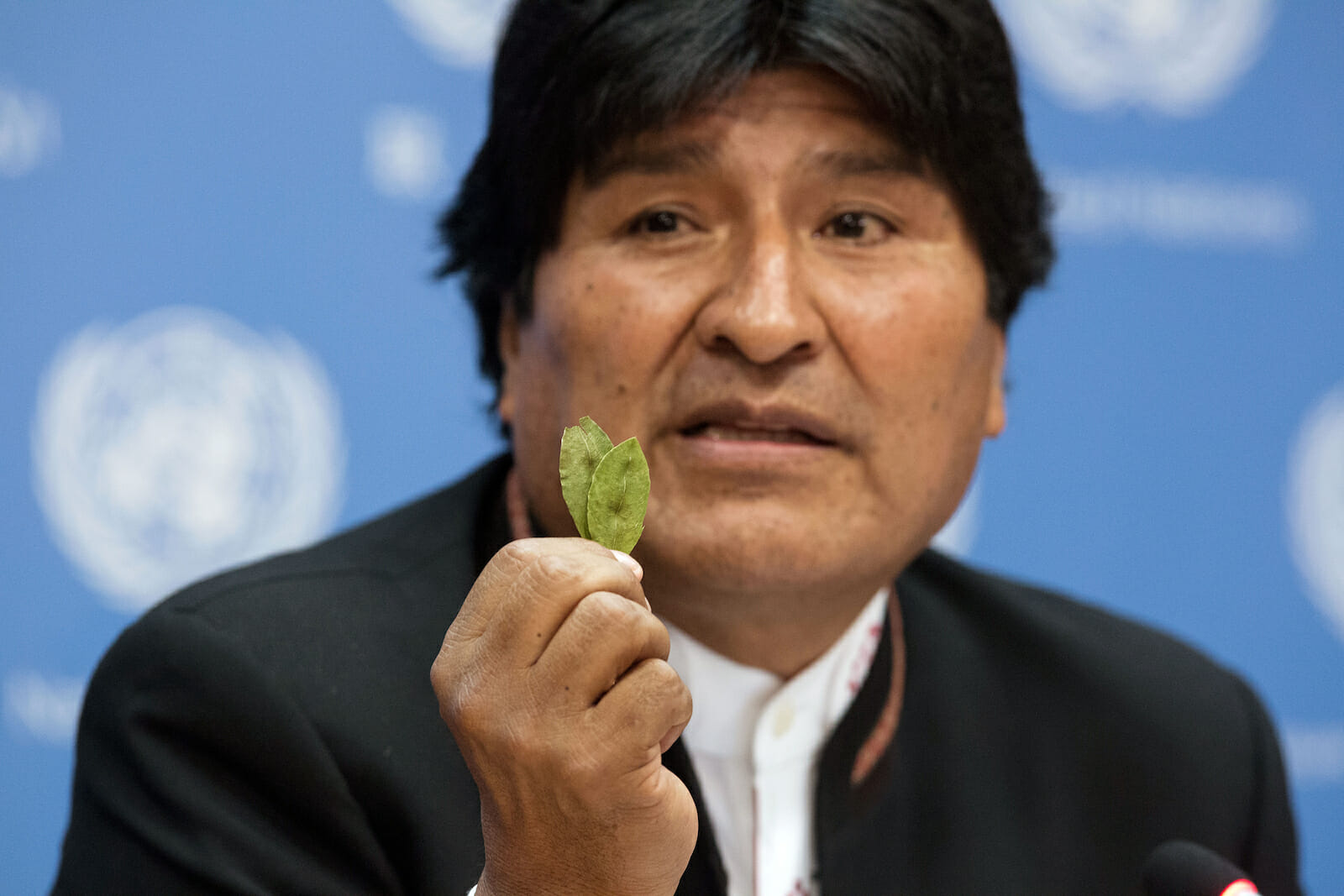
In Bolivia’s Quest to Regain the Pacific, Political Posturing is more Afterthought than Motivator
Since taking office in 2006, Bolivian President Evo Morales has been on a mission to regain access to the Pacific by way of Chile. Now that it has become painfully obvious that Chile is unwilling to engage in meaningful negotiations—Chilean President Sebastián Piñera has called Bolivia’s vision “impossible” — Morales has announced his intent to bring the dispute before the International Court of Justice (ICJ) in The Hague. The cause is popular, and why shouldn’t it be? Landlocked Bolivia is the poorest country in South America. Surrounded by powerful neighbors Brazil, Argentina, and Chile, Bolivia has been bullied for centuries. For all that, though, it has a glorious past. Leaf through a history of colonial Latin America: After the gold of Mexico, the silver of Potosi was cherished above all else, building the surrounding area into one of the largest cities of the seventeenth century.
Pull out a map of South America from 1850: Bolivia was twice as big as it is today, stretching approximately 400 kilometers along the Pacific and deep into what is now Paraguayan territory. Fast-forward to the present: The silver is all but gone, and military defeats in the War of the Pacific (1879-1884) and Chaco War (1932-1935) have reduced Bolivia to a fraction of its former self.
Regaining a bit of coastline wouldn’t undo the entire course of history, but in the eyes of many Bolivians it would be a step in the right direction. But is it at all realistic? And, regardless, is the Morales administration sincere in its desire to reclaim the Pacific, or is it simply pandering to the sentiments of the masses?
The answer to the first question is “probably not.” As to the second, the answer may surprise us. Even if Morales and company realize the odds are against them, there is good reason to suspect that their claim to the sea is borne of a genuinely held belief.
First, let’s review what happened in the War of the Pacific. In what is now northwestern Chile, the rain shadow of the Andes and the Humboldt Current conspire to form the driest region on Earth: the Atacama Desert.
All but ignored by Spain, the Atacama remained largely uninhabited until the second half of the nineteenth century, when the commercial value of guano and saltpeter was realized. Guano’s use as a fertilizer and saltpeter’s role in weapons production rendered the Atacama coastline, rich in these deposits, of vital strategic importance. Although Peru, Bolivia, and Chile all held territory in the region, it was Chile that was able to exploit the resource most effectively.
Pushing north, Chileans set up shop in the then-Bolivian territory of Antofagasta and then-Peruvian province of Arica. The Bolivians were in an especially difficult position to compete, as the Andes imposed a natural barrier that prevented Bolivians from migrating to the coast. Perceiving its weakness and Chile’s ambitions, Bolivia entered into a secret alliance with Peru: Should Chile violate either Peruvian or Bolivian sovereignty, the other would come to the victim’s aid.
In 1879, Bolivia invoked the alliance following a Chilean company’s refusal to pay a tax recently imposed by Bolivia on guano extraction from the Antofagasta region. Before long, Bolivia and Peru were at war with Chile. Though Peru had a legitimate navy, Bolivia’s military was incredibly weak, with some soldiers still carrying flintlock muskets. Even combined, they stood no match against their neighbor to the south. By 1884, peace agreements left Chile with its current territory, pushing the Peruvian border north and cutting Bolivia off from the sea.
From a contemporary perspective, it’s easy to have sympathy for the Bolivian take on the war. Bolivians lost their coastline because they lacked the muscle to protect it. In today’s relatively developed state of international law, might does not equal right. If Chile tried the same stunt in 2012, there would be global outcry. In the late 1800s, however, things were radically different. The United States wrested the American Southwest from Mexico; European powers were still busy carving up Africa; borders all across the world were being shifted at the whim of those with more arms and more men. Is there any reason we should pay particular attention to the plight of Bolivia?
According to the administration in La Paz, there certainly is. The Treaty of Peace and Friendship of 1904—which memorialized the basic agreement struck twenty years earlier—was anything but. Although the treaty guaranteed Bolivia access to and duty-free use of the ports of Antofagasta and Arica, it stripped the already lagging Andean republic of revenue from nitrates and ensured Bolivia’s relative isolation from global markets. When copper mining took off in Bolivia’s former coastal territory in the 1950s, resentment only grew deeper. For decades, politicians and scholars analyzing the country’s economic deficiency have pointed the finger at the lack of a sovereign port.
Apart from this, the Bolivian case gains strength through a resolution adopted jointly by Chile and Bolivia in 1979. The resolution urged Chile to take action to end the dispute and stated that “it is of the continent’s permanent interest to find a fair settlement in which Bolivia shall obtain sovereign and useful access to the Pacific Ocean.”
In a recent turn of events, Peru has also decided to back the claim made by Bolivia. On December 22, Peruvian President Ollanta Humala called the demand “legitimate” and said his administration supported “our brothers in Bolivia to have their outlet to the sea.” Embroiled in its own dispute with Chile over fishery rights, Peru’s support may not mean much substantively, but it is sure to embolden Bolivia as it contemplates bringing suit in The Hague. From a legal and practical standpoint, Bolivia’s argument seems unlikely to prevail.
Unfortunately, national borders in modern times are almost exclusively modified as a result of hostilities or, in the case of the former Soviet Union, through the collapse of an empire. Still, even if Bolivia were to bring and lose its case in court, don’t expect Bolivians or their government to give up the fight. Emotionally, the idea of recapturing the sea runs too deep. Every year on March 23 Bolivians celebrate El Dia del Mar (“The Day of the Sea”), a symbolic yet very real gesture that embodies both frustration and hope. It is a frustration and hope not only held by the people, but also by the politicians.
Though impossible to know for certain, there is good reason to believe that President Morales and his supporters are inspired by a genuinely held belief that Bolivia has a right—whether legal or moral—to a portion of the Pacific coast. Morales and company know full well that the cause is a popular one—at least locally—and they certainly appreciate the positive sentiment it generates among Bolivian voters. Especially after recent setbacks regarding a shift towards judicial elections and the construction of a freeway through a national park, Morales could use the chance to play the hero again. That being said, the potential political upside of pressing the case is not obviously the real motivator. Morales has tried to negotiate with Chile on the issue, going so far as to hint at a possible deal that would bring Bolivian natural gas to Chilean homes at a discount price.
Even if Evo knows that a legal case before the ICJ would likely flop, that doesn’t necessarily mean that it’s all for show. Many litigants insist on maintaining positions despite knowing that they will not prevail. Especially when negotiations are leading nowhere, the idea of bringing a lawsuit isn’t so crazy after all.
What do Bolivia and Morales have to lose? Perhaps credibility amongst some within the international community, but that is something Morales has never coveted. None of us are in Evo’s mind, but until there is clear evidence suggesting a lack of good faith, we should hesitate before questioning his sincerity on this issue. If the President and his counselors share the outlook of most Bolivians, the sea is theirs by right.

